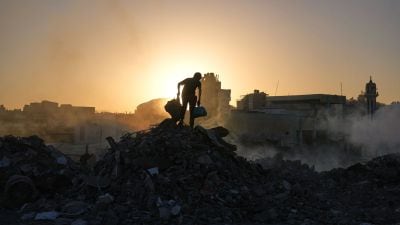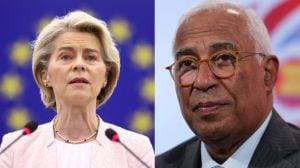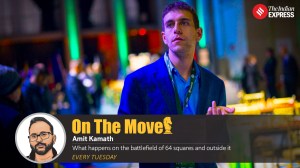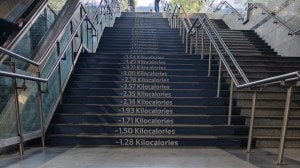Fiji’s premier, cabinet taken hostage in coup
SUVA, MAY 19: Fiji's President today declared a state of emergency in the South Pacific nation on Friday after a businessman took Fiji's f...

SUVA, MAY 19: Fiji’s President today declared a state of emergency in the South Pacific nation on Friday after a businessman took Fiji’s first ethnic Indian Prime Minister, Mahendra Chaudhry, hostage and claimed power in the name of indigenous Fijians.
Coup leader George Speight and about seven armed men stormed Fiji’s parliament early today. They fired at least two shots from automatic rifles before locking Chaudhry and his ministers in an upstairs chamber.
Some 14 hours after Speight and his companions seized the cabinet, it remained unclear how much support they had in their coup bid.
“We believe that the armed forces and the police force are loyal to the constitution,” Australia’s acting foreign minister John Moore told mediapersons.
Racial tension has mounted in Fiji between indigenous Fijians and Indians since Chaudhry won power last May, with several anti-government demonstrations in recent months. Indians make up 44 per cent of Fiji’s 800,000 population but are economically more powerful than indigenous Fijians and dominate key industries such as sugar farming.
The military, which backed a 1987 coup against an Indian-dominated government, stayed in their barracks until they were deployed late in the day to help police maintain order.
Businesses in Suva shut their doors as looting broke out in the Fijian capital, which attracts tens of thousands of tourists annually. Schools also closed. There were no reports of injuries.
“I am asking those people who are now destroying properties and looting Suva to stop and go home and stay home,” President Ratu Sir Kamisese Mara said in a broadcast on Fijian radio.
“I’m now declaring a state of emergency to maintain law and order.”The President, whose daughter Adi Koila Mara Nailatikau, was reported to be among the politicians held hostage, also imposed a curfew from 6 pm (0600 GMT) until 7 am, a New Zealand government spokeswoman said.
“I plead with those involved to release all members of the government… to go home and meet up with their families,” Mara said. It was not immediately clear what powers he had under the state of emergency or how it would be enforced.
A Fiji website reported that two battalions were deployed around major town centres to aid police. Army reservists were asked to report for duty and to bring clothes and personal belongings “to last them at least 21 days”.But there was no indication that soldiers were trying to end the hostage stand-off in parliament.
However the website said the curfew did not appear to be having much effect so far with reports of youths setting fire to kiosks at the Suva bus station despite police roaming the street.
The website, fijilive.com, was the main source of news throughout the day on the coup attempt in the remote tropical island with all telephone lines apparently cut after the attack on Parliament by Speight’s gang, armed with AK-47 assault rifles.
The assault came around 10 am as around 5,000 people demonstrated against Chaudhry on the first anniversary of his election.
Local media said Opposition members of parliament had been released and a group of 60-odd students and teachers observing parliament were also quickly freed but Chaudhry’s cabinet held.
Speight, the son of an opposition politician, declared he was taking control “on behalf of every individual member of the indigenous Fijian community” and appointed an interim administration.
His father is a close friend of Sitiveni Rabuka, who headed two coups in 1987 to depose an Indian-dominated government and was prime minister until exactly one year ago.
Rabuka met Speight during the afternoon behind the locked doors of parliament and was believed to be acting as a go-between for the coup leader and Mara. He headed to government house to meet Mara late today.
Rabuka would not comment on the outcome of the talks, the website fijilive.com reported. The hostages were reported to be unharmed.
“They have not been hurt,” Chaudhry’s daughter Rani Sharma told Australian Associated Press from her home in Suva, where the prime minister’s family was anxiously waiting. “We have been told they have been given some food to eat and a cup of tea each.”
The attempted coup was condemned by Australia, New Zealand and Britain, who called for the immediate release of the hostages and prompt return to democratic government.
Political analysts were skeptical about how much influence was held by Speight, a businessman in the logging industry known to have had run-ins with the government over the past year.
Australian Foreign Minister Alexander Downer said there was a rumour that two of the seven gunmen were army officers. “That obviously indicates there are some people in the military supporting this … But the military generally do not,” Downer said during a visit to Cambodia.
Professor Brij Lal, a Pacific expert at the Australian National University in Canberra, said: “My own sense is that the military is not a part of it (the coup) at all.”
“I don’t think it will last,” he added.
— REUTERS



- 01
- 02
- 03
- 04
- 05




























